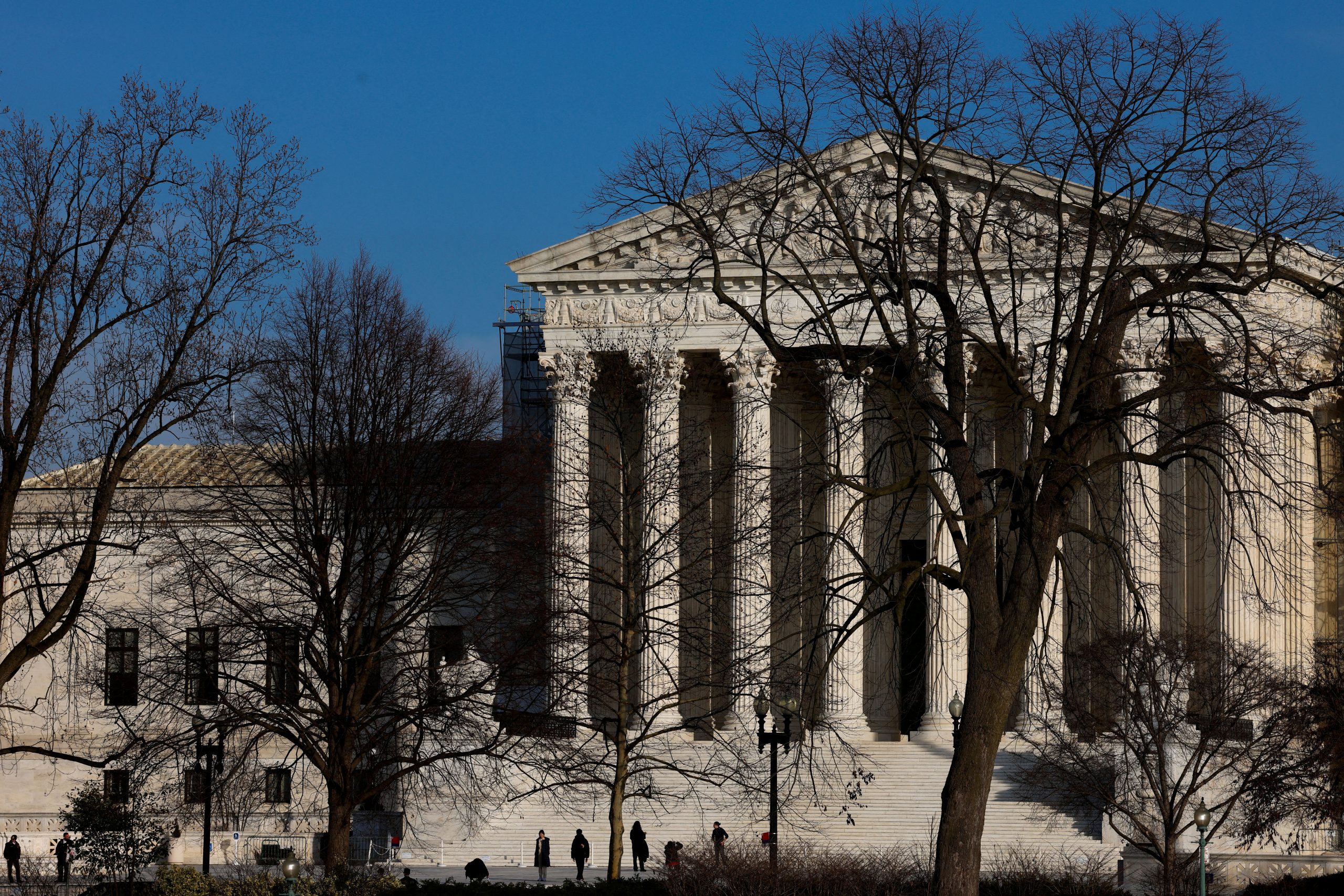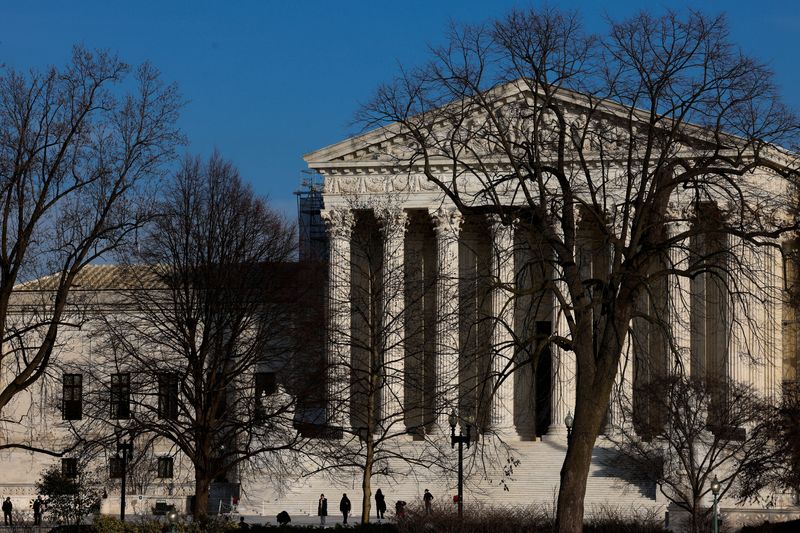Stock Markets
US Supreme Court appears split over US agency powers in fishing dispute


© Reuters. FILE PHOTO: View of the U.S. Supreme Court building in Washington, U.S., January 8, 2024. REUTERS/Julia Nikhinson/File Photo
By John Kruzel and Andrew Chung
WASHINGTON (Reuters) – The U.S. Supreme Court on Wednesday appeared divided over a bid to further limit the regulatory powers of federal agencies in a dispute involving a government-run program to monitor for overfishing of herring off New England’s coast.
The justices were hearing arguments in appeals by two fishing companies of lower court rulings allowing the National Marine Fisheries Service to require commercial fishermen to help fund the program. The companies – led by New Jersey-based Loper Bright Enterprises and Rhode Island-based Relentless Inc – have argued that Congress did not authorize the agency, part of the U.S. Commerce Department, to establish the program.
The companies have asked the court, with its 6-3 conservative majority, to rein in or overturn a precedent established in 1984 that calls for judges to defer to federal agency interpretation of U.S. laws deemed to be ambiguous, a doctrine called “ Chevron (NYSE:) deference.”
But with arguments completed in the first of the two cases and ongoing in the second, the questions posed by the justices did not reveal a clear majority willing to overturn the precedent.
Some of the conservative justices seemed skeptical of the doctrine’s continuing force. Others signaled hesitation about reversing it. The court’s liberal justices appeared ready to preserve the doctrine’s deference to the expertise of agencies.
Conservative Justice Neil Gorsuch, sounding skeptical of the precedent, said the doctrine has created confusion in lower courts in the cases before the court on Wednesday – and many others.
“Even in a case involving herring fishermen, and the question of whether they have to pay for government officials to be on board their boats … lower court judges, even here in this rather prosaic case, can’t figure out what Chevron means,” Gorsuch told Elizabeth Prelogar, the U.S. solicitor general.
Conservative Justice Brett Kavanaugh criticized Chevron as ushering in instability by making it easier for new presidential administrations to define laws differently than prior administrations.
“That is at war with reliance,” Kavanaugh told Prelogar. “That is not stability.”
But conservative Justice Amy Coney Barrett expressed worry that overruling Chevron could invite “a flood of litigation” contesting agency actions that had been previously resolved.
The bid by the commercial fishermen, supported by various conservative and corporate interest groups including billionaire Charles Koch’s network, is part of what has been termed the “war on the administrative state,” an effort to weaken the federal agency bureaucracy that interprets laws, crafts federal rules and implements executive action.
The Supreme Court has signaled skepticism toward expansive regulatory power, issuing rulings in recent years to rein in what its conservative justices have viewed as overreach by the Environmental Protection Agency and other agencies.
‘THEY DON’T KNOW’
Liberal Justice Elena Kagan said that legislation passed by Congress often leaves interpretative “gaps,” sometimes intentionally. Kagan added that federal agencies, staffed with policy experts, are better suited than courts to fill such gaps.
“Judges should know what they don’t know,” Kagan told Roman Martinez, a lawyer for Relentless.
Liberal Justice Ketanji Brown Jackson voiced a similar concern about the court substituting its own policy judgment over that of agencies.
The fish conservation program was started in 2020 under Republican former President Donald Trump. It is being defended by Democratic President Joe Biden’s administration. The regulation at issue called for certain fishermen to carry aboard their vessels U.S. government contractors and pay for their at-sea services while they monitored the catch.
The program aimed to monitor 50 percent of declared herring fishing trips in the regulated area, with program costs split between the federal government and the fishing industry. The monitors assess the amount and type of catch including species inadvertently caught.
The cost of paying for the monitoring was an estimated $710 per day for 19 days a year, which could reduce a vessel’s income by up to 20 percent, according to government figures.
The Biden administration has said the program is authorized under a 1976 federal law called the Magnuson-Stevens Act to protect against overfishing in U.S. coastal waters. It said in court papers the program was suspended for the fishing year starting in April 2023 due to insufficient federal funding.
The Washington-based U.S. Court of Appeals for the District of Columbia Circuit and the Boston-based 1st U.S. Circuit Court of Appeals both ruled in favor of the government.
Other cases now before the Supreme Court also involve the scope of agency powers.
During arguments in November, the conservative justices signaled skepticism toward the legality of certain proceedings conducted in-house by the Securities and Exchange Commission to enforce investor-protection laws. During arguments in October, the court appeared skeptical of the payday lending industry’s challenge to the Consumer Financial Protection Bureau’s funding structure.
Rulings in the fishing, SEC and CFPB cases are expected by the end of June.
Stock Markets
Suburban Propane director Logan sells $139k in shares
Stock Markets
Stock market today: S&P 500 closes lower, but posts big weekly win
Stock Markets
TD Bank promotes Laura Nitti to retail market president role

 Forex3 years ago
Forex3 years agoForex Today: the dollar is gaining strength amid gloomy sentiment at the start of the Fed’s week

 Forex3 years ago
Forex3 years agoUnbiased review of Pocket Option broker

 Forex3 years ago
Forex3 years agoDollar to pound sterling exchange rate today: Pound plummeted to its lowest since 1985

 Forex3 years ago
Forex3 years agoHow is the Australian dollar doing today?

 Cryptocurrency3 years ago
Cryptocurrency3 years agoWhat happened in the crypto market – current events today

 World3 years ago
World3 years agoWhy are modern video games an art form?

 Commodities3 years ago
Commodities3 years agoCopper continues to fall in price on expectations of lower demand in China

 Economy3 years ago
Economy3 years agoCrude oil tankers double in price due to EU anti-Russian sanctions





















